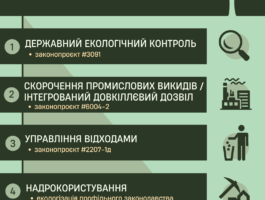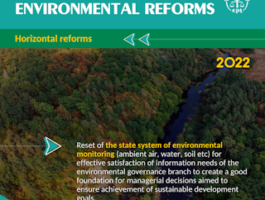- Просвітницька діяльність / Консультації
- Адміністративна реформа у сфері охорони навколишнього природного середовища
- Біорізноманіття
- State management in the field of environmental protection
- Application for protection of rights in court
- Green areas
- Water objects
- Ecological safety
- Pesticides
- Objects of increased environmental hazard
- Establishment and operation of NGOs, labor relations in NGOs
- Access to information
- Climate change
- Soil
- Environmental education
- GUTA
- Workshops and conferences
- Ecoanalytics
- Library
- Links
- Our Publications
- Our infographics
- Presentations of the international conference
- Environment People Law Journal
Ecoanalytics
 Commencement of proceedings in international courts
Commencement of proceedings in international courtsThe UN ICJ can hear two types of cases: legal disputes between states (contentious cases) and requests for advisory opinions on legal questions referred to it by United Nations organs and specialized agencies (advisory proceedings). Only states (UN members and other states that have become parties to the Statute of the Court or have accepted…
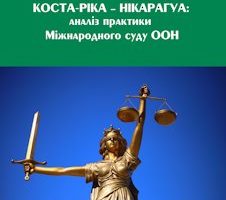 Сosta Rica – Nicaragua: analysis of the International Court of Justice practice
Сosta Rica – Nicaragua: analysis of the International Court of Justice practiceFor a long period of time relationship between Costa Rica and Nicaragua were characterized by conflict. These circumstances resulted in a considerations of problematic issues by international agencies, such as the International Court of Justice, Organization of American States. For instance, in 1998, when Nicaragua banned transit of Costa Rican police vessels on the river,…
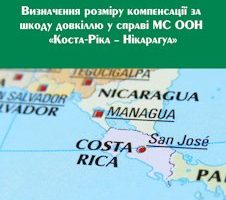 Identifying the amount of compensation for environmental damages in a case of the International Court of Justice “Costa Rica vs. Nicaragua”
Identifying the amount of compensation for environmental damages in a case of the International Court of Justice “Costa Rica vs. Nicaragua”On November 18, 2010 the Republic of Costa Rica filed an application instituting procedures against the Republic of Nicaragua with respect to “incursion, occupation of and use by the Army of Nicaragua the territory of Costa Rica, as well as [alledged] breaches of Nicaragua’s obligations towards Costa Rica”, in particular, violation of the principle of…
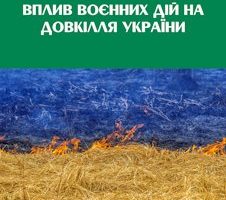 Impact of military action on the environment of Ukraine (summary)
Impact of military action on the environment of Ukraine (summary)Issue 1 From the first days of the invasion, russian troops began deliberately destroying critical infrastructure with both high-precision missiles and jet artillery. Definitely, the aim of such actions was to weaken the supply of Ukrainian cities with fuel, resources for reconstruction and to cause maximum economic damage. However, some cases recorded by us indicate…
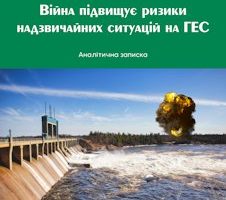 The war increases the risk of emergencies at hydropower plants (HPPs)
The war increases the risk of emergencies at hydropower plants (HPPs)Military action on the territory of Ukraine has led to many social and humanitarian problems, as well as caused serious threats of man-made emergencies resulting from the actions of the occupiers. The risks to the population associated with damage to facilities that pose an increased environmental risk are of particular concern at this time, because…
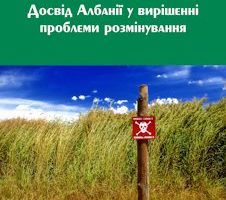 Albania’s experience in solving the problem of demining
Albania’s experience in solving the problem of deminingThe threat of land mines and similar devices in northeastern Albania stemmed from the Kosovo conflict. After a survey by the Albanian Armed Forces in 1999, 15,250,000 square meters of dangerous areas were identified. The threat was coming from anti–tank and antipersonnel mines planted by the former Yugoslav Republic, unexploded ordnance, subammunitions from jet artillery…
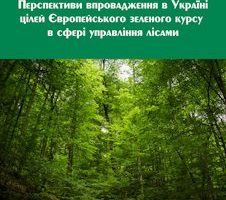 Ukraine’s prospects of the European Green Deal objectives implementation in forest management
Ukraine’s prospects of the European Green Deal objectives implementation in forest managementCurrently forest management in Ukraine is characterized by a number of systemic problems making it extremely inefficient and leading to the degradation of our forests. In fact, the State Forest Resources Agency of Ukraine concentrates excessive and contradictory powers, which contribute exclusively to the economic direction of both regulatory and supervisory activities, without due regard…
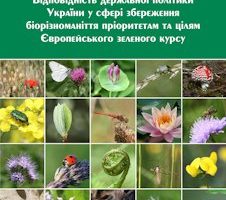 Compliance of the state policy of Ukraine in the area of biodiversity conservation with priorities and targets of the European Green Deal
Compliance of the state policy of Ukraine in the area of biodiversity conservation with priorities and targets of the European Green DealThis policy paper examines 17 indicators of the Biodiversity Strategy as part of the European Green Deal. It presents materials that reveal what stage our society is at and how much is left to achieve the set targets for the conservation of Ukraine’s biodiversity. Its importance lies in the fact that Ukraine is on the…
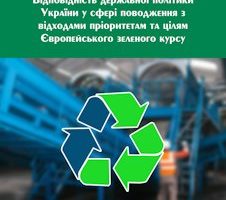 Compliance of the public policy of Ukraine in the area of waste management with the priorities and goals of the European Green Deal
Compliance of the public policy of Ukraine in the area of waste management with the priorities and goals of the European Green DealThe European Green Deal (EGD) is a key cross-cutting sectoral environmental policy in Europe aimed at improving the well-being and health of EU citizens and future generations through: fresh air, clean water, soil and biodiversity, renovated energy efficient buildings, healthy and affordable food, more public transport, clean energy and modern clean technological innovations, products that…
 Assessment of Ukraine’s implementation of the EU-Ukraine Association Agreement in the area of environmental protection
Assessment of Ukraine’s implementation of the EU-Ukraine Association Agreement in the area of environmental protectionThis document assesses Ukraine’s progress in fulfilling certain obligations under the EU-Ukraine Association Agreement in terms of cooperation in carrying out institutional reforms in the area of environmental protection (Article 365 of Chapter 6 “Environment” of Title V “Economic and Sector Co–operation”), as well as the gradual approximation of Ukrainian legislation in the area of…

